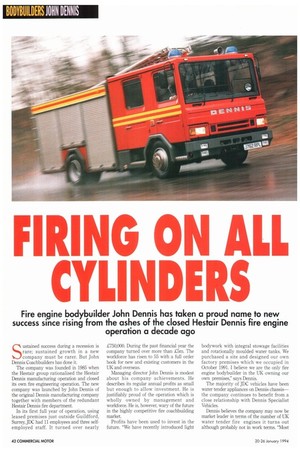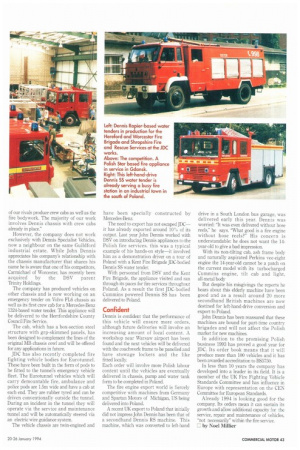FIRING ON ALL CYLINDERS
Page 44

Page 45

If you've noticed an error in this article please click here to report it so we can fix it.
Sustained success during a recession is rare; sustained growth in a new company must be rarer. But John Dennis Coachbuilders has done it.
The company was founded in 1985 when the Hestair group rationalised the Hestair Dennis manufacturing operation and closed its own fire engineering operation. The new company was launched by John Dennis of the original Dennis manufacturing company together with members of the redundant Hestair Dennis fire department In its first full year of operation, using leased premises just outside Guildford, Surrey, JDC had 11 employees and three selfemployed staff. It turned over nearly 4750,000. During the past financial year the company turned over more than £5m. The workforce has risen to 55 with a full order book for new and existing customers in the UK and overseas.
Managing director John Dennis is modest about his company achievements. He describes its regular annual profits as small but enough to allow investment. He is justifiably proud of the operation which is wholly owned by management and workforce. He is, however, wary of the future in the highly competitive fire coachbuilding market.
Profits have been used to invest in the future. "We have recently introduced light bodywork with integral stowage facilities and rotationally moulded water tanks. We purchased a site and designed our own factory premises which we occupied in October 1991. I believe we are the only fire engine bodybuilder in the UK owning our own premises," says Dennis.
The majority of JDC vehicles have been water tender appliances on Dennis chassis— the company continues to benefit from a close relationship with Dennis Specialist Vehicles Dennis believes the company may now be market leader in terms of the number of UK water tender fire engines it turns out although probably not in work terms. 'Most of our rivals produce crew cabs as well as the fire bodywork. The majority of our work involves Dennis chassis with crew cabs already in place."
However, the company does not work exclusively with Dennis Specialist Vehicles, now a neighbour on the same Guildford industrial estate. While John Dennis appreciates his company's relationship with the chassis manufacturer that shares his name he is aware that one of his competitors, Carmichael of Worcester. has recently been acquired by the DSV parent Trinity Holdings.
The company has produced vehicles on other chassis and is now working on an emergency tender on Volvo FL6 chassis as well as its first crew cab for a Merced-Benz 1324-based water tender. This appliance will be delivered to the Hertfordshire County Council Fire Service.
The cab, which has a box-section steel structure with grp-skimmed panels, has been designed to complement the lines of the original MB chassis cowl and will be offered for any applications in future, JDC has also recently completed fire fighting vehicle bodies for Eurotunnel. These have been built in the form of pods to be fitted to the tunnel's emergency vehicle fleet. The Eurotunnel vehicles which will carry demountable fire, ambulance and police pods are 1.5m wide and have a cab at each end. They are rubber tyred and can be driven conventionally outside the tunnel. During an incident in the tunnel they will operate via the service and maintenance tunnel and will be automatically steered via an electric wire guidance system.
The vehicle chassis are twin-engined and have been specially constructed by Mercedes-Benz.
The need to export has not escaped JDCit has already exported around 100. of its output. Last year John Dennis worked with DSV on introducing Dennis appliances to the Polish fire services, this was a typical example of his hands-on style—it involved him as a demonstration driver on a tour of Poland with a Kent Fire Brigade JDC-bodied Dennis SS water tender.
With personnel from DSV and the Kent Fire Brigade, the appliance visited and ran through its paces for fire services throughout Poland. As a result the first JDC-bodied Cummins powered Dennis SS has been delivered to Poland.
Dennis is confident that the performance of this vehicle will ensure more orders, although future deliveries will involve an increasing amount of local content. A workshop near Warsaw airport has been found and the next vehicles will be delivered with the coachwork frame to be panelled and have stowage lockers and the like fitted locally.
Each order will involve more Polish labour content until the vehicles are eventually delivered in chassis, pump and water tank form to be completed in Poland_ The fire engine export world is fiercely competitive with machines from Germany and Spartan Motors of Michigan, US being delivered into Poland.
A recent UK export to Poland that initially did not impress John Dennis has been that of a secondhand Dennis RS machine. This machine, which was converted to left-hand
drive in a South London bus garage, was delivered early this year. Dennis was worried: "It was even delivered without hose reels," he says. "What good is a fire engine without hose reels?" His concern is understandable: he does not want the 14year-old to give a bad impression.
With its non-tilting cab, ash frame body and naturally aspirated Perkins vee-eight engine the 14-year-old cannot be a patch on the current model with its turbocharged Cummins engine, tilt cab and light, all-metal body
But despite his misgivings the reports he hears about this elderly machine have been good and as a result around 20 more secondhand British machines are now destined for left-hand-drive conversion and export to Poland.
John Dennis has been reassured that these machines are bound for part-time country brigades and will not affect the Polish market for new machines In addition to the promising Polish business 1993 has proved a good year for JDC. Its order book means that it will produce more than 100 vehicles and it has been awarded accreditation to BS5750.
In less than 10 years the company has developed into a leader in its field. It is a member of the UK Fire Fighting Vehicle Standards Committee and has influence in Europe with representation on the CEN Committee for European Standards.
Already 1994 is looking good for the company. Its orders mean it can sustain its growth and allow additional capacity for the service, repair and maintenance of vehicles, "not necessarily" within the fire service.




















































































